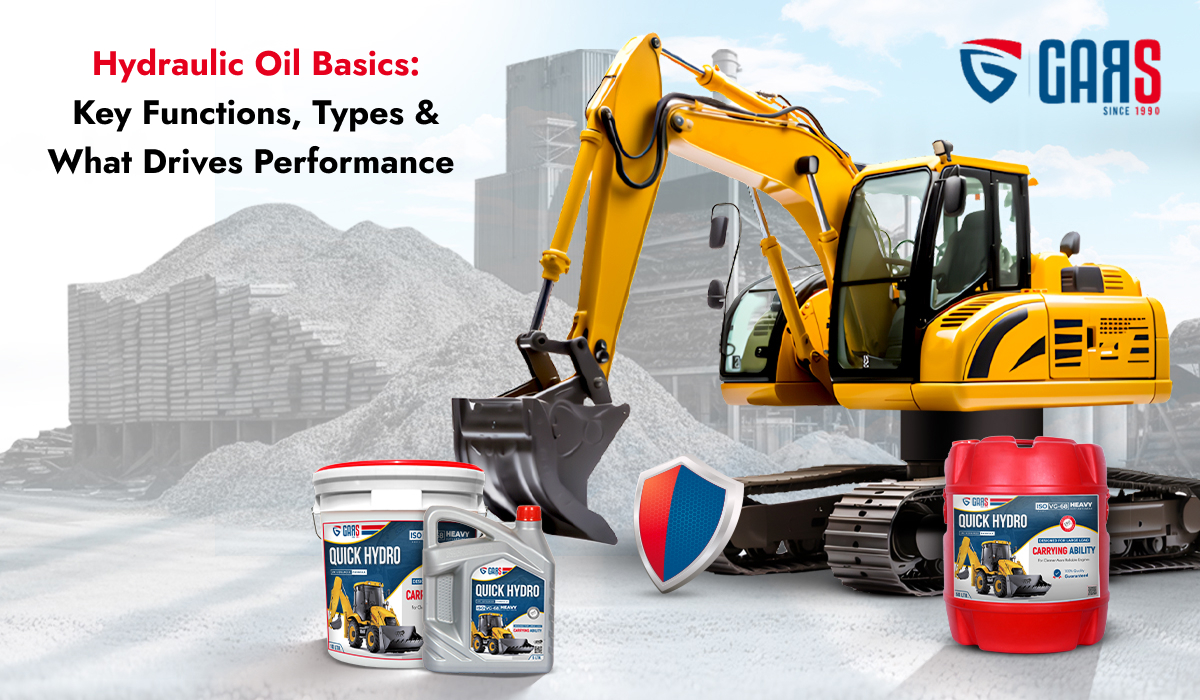Hydraulic Oil Basics: Key Functions, Types & What Drives Performance

Hydraulic Oil Basics: Key Functions, Types & What Drives Performance
Hydraulic systems are the heart of many industries heavy machinery and air transport, to manufacturing facilities, and
even ordinary cars. Everything depends on hydraulic oil, which is a specific type of oil that hydraulic systems depend
on. Hydraulic systems rely on hydraulic oil to ensure that they work in an easy, efficient, and dependable manner. Even
though it's important, hydraulic oil is often neglected or not properly understood until there is a problem.
This article serves to help you know the basics of hydraulic oil: its functions, different types, and performance issues
that matter the most. This article aims to demystify the concept for everyone, be it engineers, equipment operators, or
simply inquisitive minds.
Hence, more companies are taking the lead on applying the right lubrication schedules and high-quality lubricants to
change the operation of machinery completely.
What Exactly is Hydraulic Oil?
Hydraulic oil, widely popular as hydraulic fluid, is used for transmitting power in hydraulic systems. Unlike regular lubricants, it does much more than reduce friction—it also transmits energy and heat, and provides wear and corrosion protection. Hydraulic oil is comparable to the blood and nervous system of hydraulics. It keeps the system functioning and delivers accurate, controlled movements. The absence of proper oil will cause poor performance or even failure of the most advanced hydraulic systemThe Core Functions of Hydraulic Oil Basics
Each function performed by hydraulic oil is important. Consider the top 5 points, be aware of them:Power Transmission
Hydraulic systems use oil under pressure to drive actuators, pistons, and motors. The power-transmitting capability of the oil significantly impacts how smoothly and efficiently the equipment functions.Lubrication
Moving parts cause friction. By creating a protective coating over the opposing surfaces, hydraulic oil lessens wear and avoids expensive breakdowns.Heat Dissipation
Heat is generated by high-pressure operations. Hydraulic oil dissipates heat and absorbs it, which prevents overheating and allows the system to operate smoothly.Contamination Control
Hydraulic oil removes very small particles and dirt that could damage machinery. In some cases, newer oils include additives for better cleaning.Corrosion & Oxidation Protection
Water and oxygen may cause metal parts to corrode. Inhibitors found in hydraulic oil protect the components against rust and chemical deterioration. To summarize, the right hydraulic oil harnesses energy, shields components, and enhances control — the three pillars of hydraulics that work well. Read more: 9 Hottest Lubrication Trends You Need To Know NowTypes of Hydraulic Oil Basics
All hydraulic oils are different. The selection requires careful consideration of the system, environment, and operating conditions. These are 3 types of hydraulic oil:Mineral-Based Hydraulic Oil
Mineral-based hydraulic oils are manufactured from refined crude oil and use appropriate additives to meet performance requirements. Properly formulated mineral-based hydraulic oils can be effective and economical alternatives to synthetics.Synthetic Hydraulic Oil
Synthetic oils are man-made fluids. Their molecules are specifically designed to provide numerous advantages such as stability in fluid properties, improved lubricity, and other performance-enhancing characteristics. Synthetic oils are usually selected for hydraulic systems involving high pressures and/or extreme temperatures as they perform better under such operating conditions. For one, synthetic oils are generally costly and have special handling requirements. They also pose compatibility concerns.Water-based Hydraulic Oil
These oils are the rarest and are primarily used in conditions where there is a significant fire hazard. Such oils do not offer protection against wear and are only suited for certain niche applications.Fire-Resistant Hydraulic Oil
Fire-Resistant Hydraulic Oil is designed to eliminate flammability risks, and thus it is an essential option for high-risk environments. The oil is commonly used in the mining industry, steel mills, and foundries, where it is impossible to avoid exposure to intense heat. Although fire-resistant fluids ensure higher safety, every variant has its own strengths and sacrifices. It is for this reason that the selection should always be made considering the operating conditions as well as the system's specific safety needs.What Drives Hydraulic Oil Performance?
The performance of hydraulic oil isn’t about choosing mineral over synthetic; rather, it’s about various concerns that relate to its long-term performance. Think about the most critical one:1. Viscosity
Viscosity measures the thickness of oil. If it’s too thick, the system will struggle with sluggish flow. If it’s too thin, the oil won’t provide adequate lubrication. The right viscosity offers trouble-free operation within temperature ranges.2. Additives
Modern hydraulic oils are formulated with additives that enhance their performance, including:- Anti-wear agents to protect components.
- Anti-foaming agents to prevent air bubbles that hinder power transmission.
- Detergents and dispersants to control contamination.
3. Oxidation Stability
Oil that resists oxidation will continue to function effectively for a longer time and will not foster the creation of unhealthy sludge and varnish in the system. Oxidation stability is of greater concern in high-temperature or extended duty systems.4. Water Tolerance
Hydraulic oil should separate easily from water to help prevent corrosion, loss of lubricity, and bacterial action.5. Filtration Compatibility
Even the best oil will fail if dirt clogs the system. Good hydraulic oils retain their characteristics When used with filters to clean systems. Together, these elements determine whether the oil will merely "work" or provide long-term dependability and efficiency.Why Selecting Proper Hydraulic Oil Basics is Important
The repercussions of using the wrong or low-quality oil are dire:- ncreased wear and tear on the component.
- ecreased system efficiency.
- hortened equipment life.
- nvoluntary downtime and expensive repairs.
- onversely, investing in the proper oil results in:
- ower maintenance expenses.
- mooth and consistent machine performance.
- xtended equipment lifespan.
- mproved safety and reliability.
